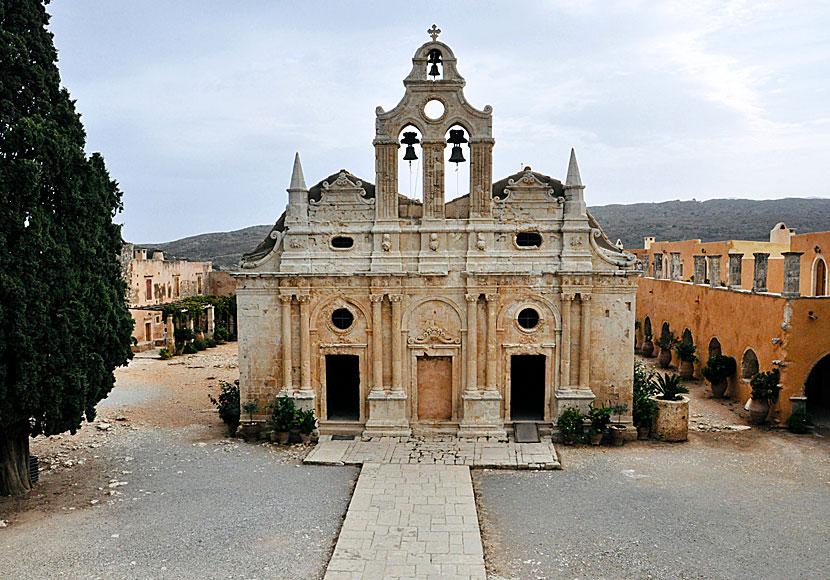
 |
| ISLANDS A-Z | CRETE | CYCLADES | DODECANESE | EASTERN AEGEAN |
| IONIAN | SARONIC | SPORADES | MAINLAND | ABOUT US |
Arkadi Monastery near Rethymnon in Crete |
|
|
The Monastery of Arkadi, about 20 kilometres southeast of Rethymno, was once one of the largest and richest monasteries in Crete. The architecture is striking, not only the church itself, but also the other buildings of the monastery complex. The complex is large in terms of area. Just the impressive church together with the buildings are worth the trip here. But the reason why so many go here is a tragic event. Busloads of tourists and Greeks arrives here every day.
Arkadi Monastery.
The grand entrance to the monastery area.

The Monastery of Arkadi. |
|
The monastery is most known for the role it played in the Cretan revolt of 1866-1869 against the occupying Turkish forces. There is much to tell about Moni Arkadi, several books have been written about the monastery, and the massacre that took place in November 1866. If you are interested I can recommend Arkadi, the historic monastery. The book does not cost many euros and can be bought in Arkadi, and in Rethymno, as well as in other larger places. Here is a brief summary of what happened in November 1866:The monastery served as a stronghold for freedom fighters who participated in the rebellion against the Turks. The Turkish Pasha in Rethymno issued an ultimatum that the monastery would stop shelter the Cretan freedom fighters, if not the monastery would be destroyed. Abbot Gabriel in Arkadi refused to obey the Turks. Then the Turks attacked Arkadi with about 15,000 soldiers in November 1866. There were 964 people inside the monastery, most women and children, only 325 of them where men and the ones that where supposed to defend the monastery. The Cretans feared to be captured by the Turks, who were known for their cruelty. They were more afraid of the Turks than of death. Abbot Gabriel decided that they would try to resist. They did fight, but it didn't help since the Turks were superior in number. In the evening of November 9, the Turkish cannons destroyed the doors and they entered the monastery. At the same time, the Cretans had run out of ammunition and many
of them were forced to fight with knives and bayonets. As you can see,
it was impossible for the Cretans to defend themselves.
The powder magazine that Konstantinos Giaboudakis blew up.
The majority of the women and children who survived hid in a gunpowder magazine. The patriot Konstantinos Giaboudakis went to the gunpowder magazine. He brought a torch that is said to have belonged to Abbot Gabriel. When the Turks arrived at the door of the powder magazine, Konstantino took the torch and set fire to the gunpowder, resulting in a huge explosion, and numerous of dead, both Cretans and Turks. Afterwards, the Turks looted the monastery and then proceeded with their killing. Of the 964 Cretans who hid in the monastery, 3 escaped, 114 were captured and imprisoned in Rethymno, the rest of them died in the explosion or were killed by the Turks. About 1,500 Turks died.
Monks' cells in Arkadi Monastery. |
|
The church of Arkadi Monastery and the magnificent monastery courtyard.
The architecture of the monastery is very special and beautiful.
In the picture below I have drawn a white arrow next to a white arrow on an old cypress tree. In the tree are a bullet from a Turkish weapon. As said, there is many interesting things to tell about Moni Arkadi, not just about the massacre, so buy a book to learn more. Don't miss to visit this very interesting monastery. The monastery is open every day between 09.00-20.00 in season, other times of the year they close earlier.
A bullet remains in the cypress from the battle of Arkadi.
The Turkish bullet still lodged in the cypress.
If you stay in Rethymnon or its vicinity, I think you must visit this very interesting monastery. If you want to go for a swim after seeing the monastery, go to Plakias on the south coast, preferably via the nice village of Spili. |
WHAT YOU MUST NOT MISS WHEN YOU ARE IN THE AREA |
HOME |
ABOUT US |
SEARCH |
BOOK HOTEL |
GREEK ISLANDS |
SWEDISH
|
|
© 2007-2026 | Janne Eklund | Kalispera and Kalimera. |